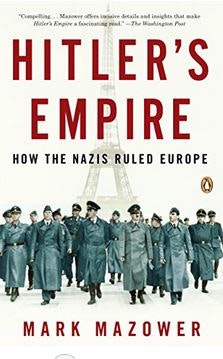 Branko Milanovic over at his Substack:
Branko Milanovic over at his Substack:
Mark Mazower’s “Hitler’s Empire: How the Nazis ruled Europe” is a magisterial book.
I read it on vacation, and it is not a book I would suggest you take with you to the beach. Unless you want to spoil your vacation. But once you have made such a choice, you cannot stop reading it and the book will stay with you throughout your stay (and I believe much longer).
This Summer I read, almost back-to-back Adam Tooze’s “The deluge” and Mazower’s book. The first covers the period 1916-31, the second, the Nazi rule of Europe 1936-45. They can be practically read as a continuum, but they are two very different books. Tooze’s is, despite all the carnage of World War I and Russian Civil War, an optimistic book in which sincere or feigned idealism is battling conservatism and militarism. As I wrote in my review of Tooze’s book, the emphasis on the failed promise of liberal democracy (but a promise still it was) is a thread that runs through most of the book. Mazower’s book, on the other hand, is unfailingly grim and this is not only because the topic he writes about is much more sinister. The tone is bleaker. It is a book about the unremitting evil. It is the steady accumulation of murders, betrayals, massacres, retaliations, burned villages, conquests, and annihilation that makes for a despairing and yet compelling read. Europe was indeed, as another of Mazower’s book is titled, the dark continent.
Here I would like to discuss another aspect of Mazower’s book that is implicit throughout but is mentioned rather discreetly only in the concluding chapter. It concerns the place of the Second World War in global history. The conventional opinion is that the Second War should be regarded as a continuation of the First. While the First was produced by competing imperialisms, the Second was the outcome of the very imperfect settlement imposed at the end of the War, and the difference in interpretations as to how the War really ended (was it an armistice, or was it an unconditional surrender).
But that interpretation is (perhaps) faulty because it cannot account for the most distinctive character of the World War II, namely that it was the war of extermination in the East (including the Shoah). That is where Mazower’s placing of the War in a much longer European imperial context makes sense.
More here.
